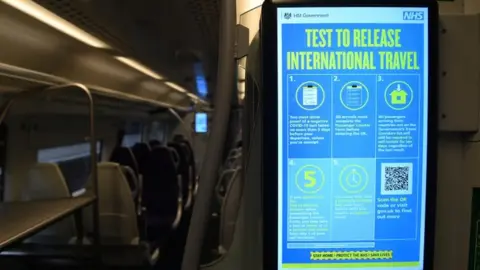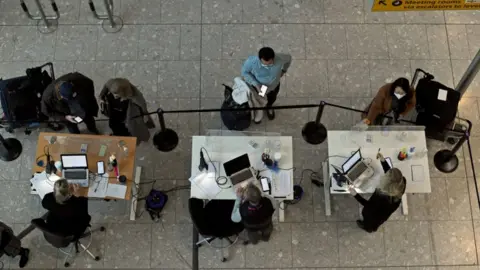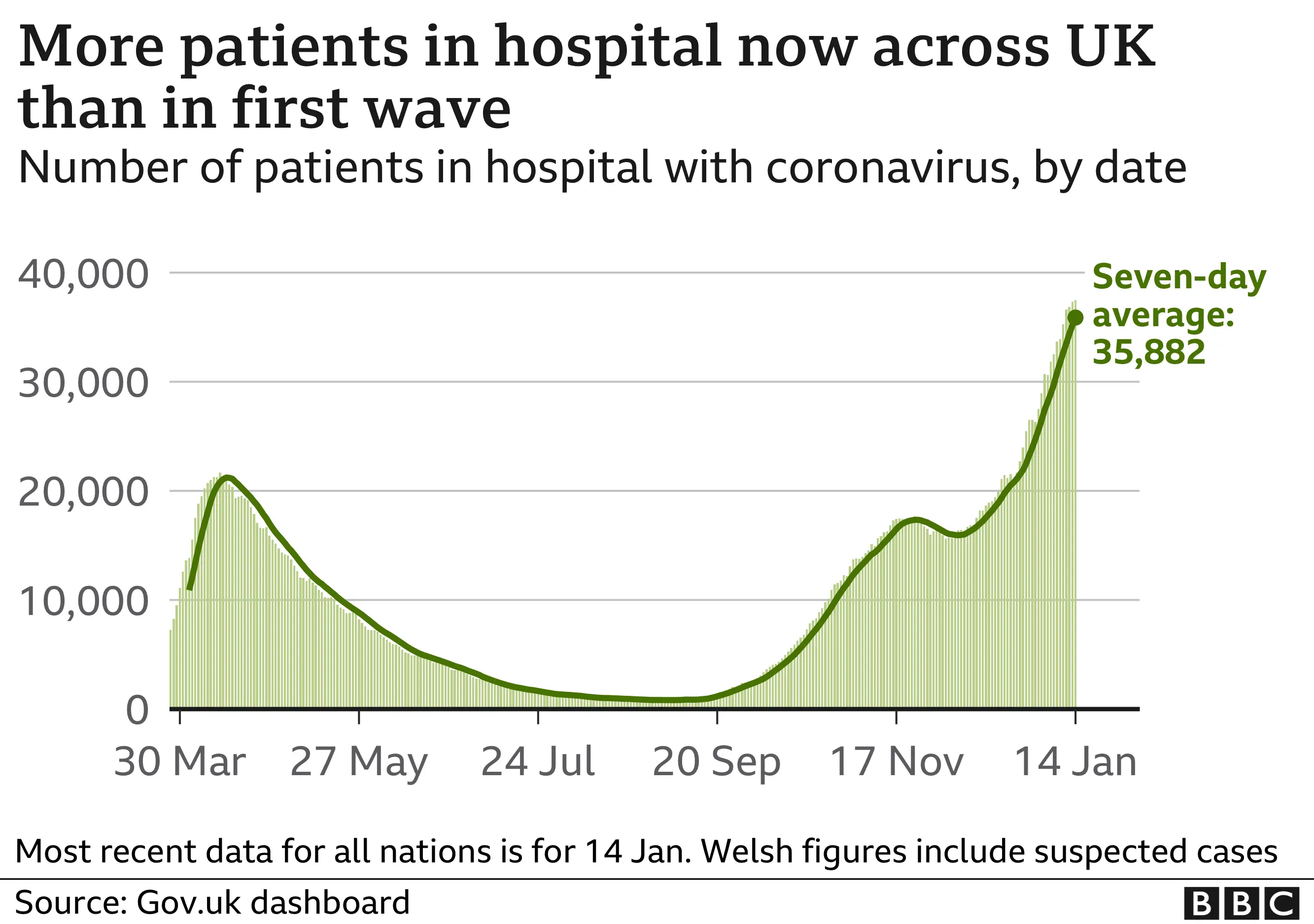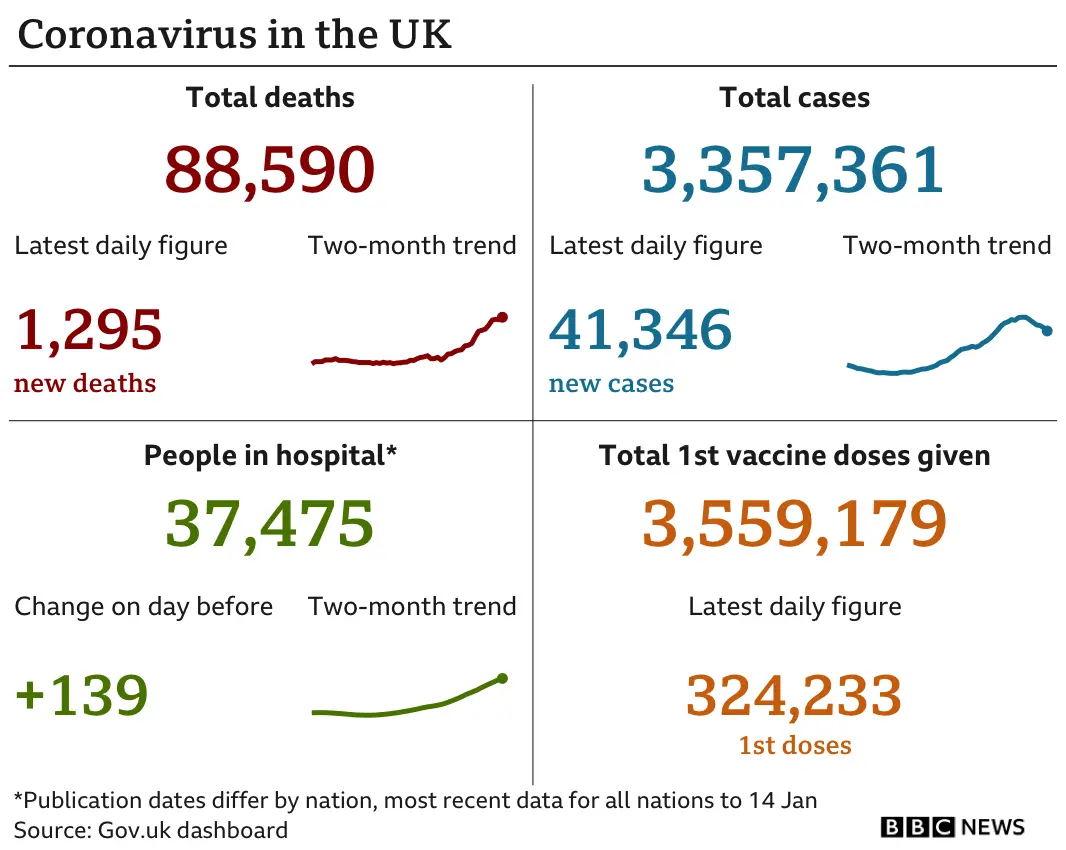Covid: UK closes all travel corridors until at least 15 February
 EPA
EPAAll UK travel corridors, which allow arrivals from some countries to avoid having to quarantine, have now closed.
Travellers arriving in the UK, whether by boat, train or plane, also have to show proof of a negative Covid-19 test to be allowed entry.
The test must be taken in the 72 hours before travelling and anyone arriving without one faces a fine of up to £500.
All passengers will still be required to quarantine for up to 10 days.
The isolation period can be cut short with a negative test after five days in England, but it does not apply in Scotland, Wales or Northern Ireland.
The government has said the travel corridor closure will be in force until at least 15 February.
Under the new rules, travellers arriving from the Falklands, St Helena and Ascension Islands are exempt.
Those arriving from some Caribbean islands are exempt until 04:00 GMT on Thursday 21 January.
Foreign Secretary Dominic Raab told the BBC'S Andrew Marr Show on Sunday that Public Health England would be stepping up checks on travellers who must self-isolate.
He said enforcement checks at borders would also be "ramped up" and added that asking all arrivals to self-isolate in hotels was a "potential measure" the government was keeping under review.
Passengers arriving into London's Heathrow airport on Monday said they had been met with "substantial" queues at passport control and one couple complained they had "felt unsafe" due to what they described as poor social distancing.
 PA Media
PA MediaAndy Hart, from London, who had arrived into the UK from Nairobi, said: "We felt that even though everyone was masked they were far too close together.
"It took an hour and 10 minutes. I've been flying 30 times a year for 20 years. I mean, once or twice have I ever seen it [airport queues] like this. How can this happen during Covid times?"
Meanwhile on Sunday, the government announced that a financial support scheme for airports in England would open this month in response to the new travel curbs.
Aviation minister Robert Courts said the aim was to provide grants of up to £8m per applicant by the end of this financial year. The scheme was first announced in November but without a start date.
Industry groups have warned there was only so long airports could "run on fumes", following the announcement of the new quarantine rules.
EasyJet chief executive Johan Lundgren said the closure of the travel corridors will not have a "significant impact" on his airline in the short term as flight numbers were already limited due to the pandemic.
He told BBC Radio 4's Today programme that the minimum number of days arrivals must wait to take a negative test releasing them from quarantine could be reduced from five days to three days.
Karen Dee, chief executive of trade body the Airport Operators Association, said she supported the decision to close the travel corridors but stressed the need for "a clear pathway out".
A ban on travellers from South America, Portugal and Cape Verde also came into force on Friday, having been imposed over concerns about a new variant identified in Brazil.
New variants causing concern have previously been identified in the UK and South Africa, with many countries imposing restrictions on arrivals from both nations.
Scientists fear the variants seen in South Africa and Brazil may interfere with the effectiveness of vaccines and evade parts of the immune system.


The travel industry has said closing the travel corridors was understandable due to the health emergency, but warned it would deepen the crisis for the sector.
Tim Alderslade, chief executive of Airlines UK, said the system had been "a lifeline for the industry" last summer but "things change and there's no doubting this is a serious health emergency". He said he assumed the government would remove the latest restrictions as soon as it was safe.
"We've had no revenue now effectively for 12 months, give or take a few months in the summer last year. If we're going to have an aviation sector coming out of this we need to open up in the summer," he told the BBC.
The Department for Transport has said it is supporting the travel industry with an extension to the furlough scheme until the end of April, business rates relief and tax deferrals.
With all parts of the UK under strict virus rules amid high levels of infection, only essential travel is permitted.
On Sunday, another 671 deaths within 28 days of a positive Covid test were reported in the UK, and a further 38,598 lab-confirmed cases of coronavirus.


- NEWSCAST: How worried should we be about the Brazilian Covid variant?
- 6 DEGREES FROM JAMIE AND SPENCER: The boys are back! Who’s going to be their first celeb target?


Are you due to travel back to the UK from overseas? Do you work in the travel industry? Email [email protected].
Please include a contact number if you are willing to speak to a BBC journalist. You can also get in touch in the following ways:
- WhatsApp: +44 7756 165803
- Tweet: @BBC_HaveYourSay
- Please read our terms & conditions and privacy policy
If you are reading this page and can't see the form you will need to visit the mobile version of the BBC website to submit your question or comment or you can email us at [email protected]. Please include your name, age and location with any submission.
